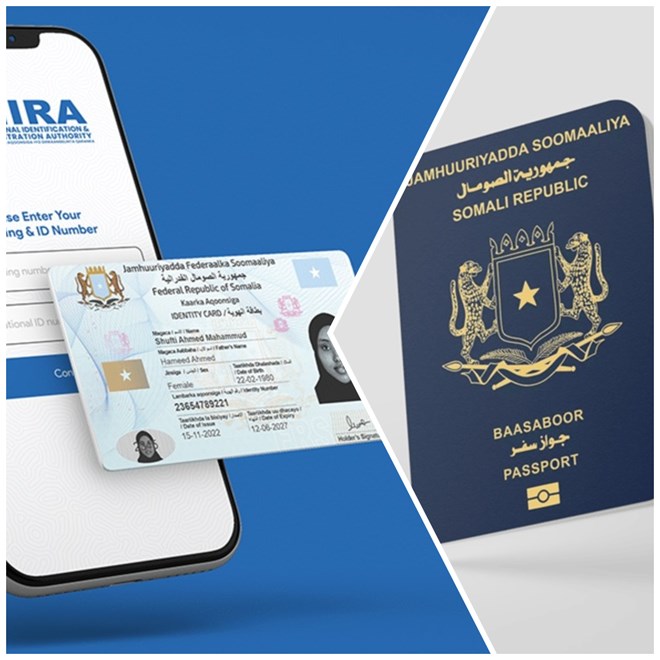
Friday July 11, 2025

Mogadishu (HOL) — Somalia’s Immigration and Citizenship Agency says the country has not yet begun using the newly introduced national identity card for passport applications due to unresolved technical and institutional coordination challenges.
Although the government launched its digital national ID system in 2022 through the National Identification and Registration Authority (NIRA), Somali citizens are still required to present traditional documents—such as birth certificates, citizenship records, and clearance letters from the Criminal Investigation Department (CID)—to obtain passports.
Immigration and Citizenship Agency Director General Mustafe Dhuxulow said the primary reason for the delay is the absence of a unified data-sharing framework between identity-issuing agencies.
“There is currently no formal integration between our systems and NIRA,” Dhuxulow said. “Before we can rely solely on the national ID, we must reconcile legacy data with new records and build a secure, interoperable system to prevent duplication and ensure accuracy.”
Dhuxulow added that efforts are underway to connect NIRA’s database with the Immigration Agency to allow passports to be issued directly using the national ID. However, no formal timeline has been announced for completing this integration.
NIRA, established by federal law in 2023, is tasked with overseeing Somalia’s civil registration and national identity systems. Despite the launch of biometric registration platforms such as e-Aqoonsi and Hubiye, officials acknowledge that progress has been hampered by infrastructure limitations, particularly in regions where access to digital services is minimal. As of June 2025, only a fraction of Somalia’s population had been enrolled in the system, according to NIRA officials quoted by Biometric Update.
Meanwhile, the federal government has begun conditioning access to key public services on possession of the national ID card. In June 2025, the Ministry of Transport announced that IDs would be required for obtaining driver’s licenses and registering vehicles. Other services—including education, healthcare, legal documentation, and domestic or international travel—are expected to follow.
The Ministry of Interior, Federal Affairs and Reconciliation said the decision is part of a national push to digitize public administration, enhance service delivery, and improve security by ensuring that every Somali is accurately identified and documented.
Puntland and some other federal member states have resisted the federal rollout, accusing Mogadishu of centralizing power through identity infrastructure. In public statements, Puntland officials argued that NIRA was bypassing regional institutions and undermining federalism.
Despite this friction, the federal government insists the ID program is a non-political initiative aimed at modernizing governance.
In January 2025, NIRA Director General Abdiwali Abdulle denied claims that the ID system was linked to upcoming elections, stating that its purpose was to ensure equitable access to government services.
As Somalia prepares for the 2026 elections, the national identity system is expected to play a major role in voter registration and electoral transparency.






